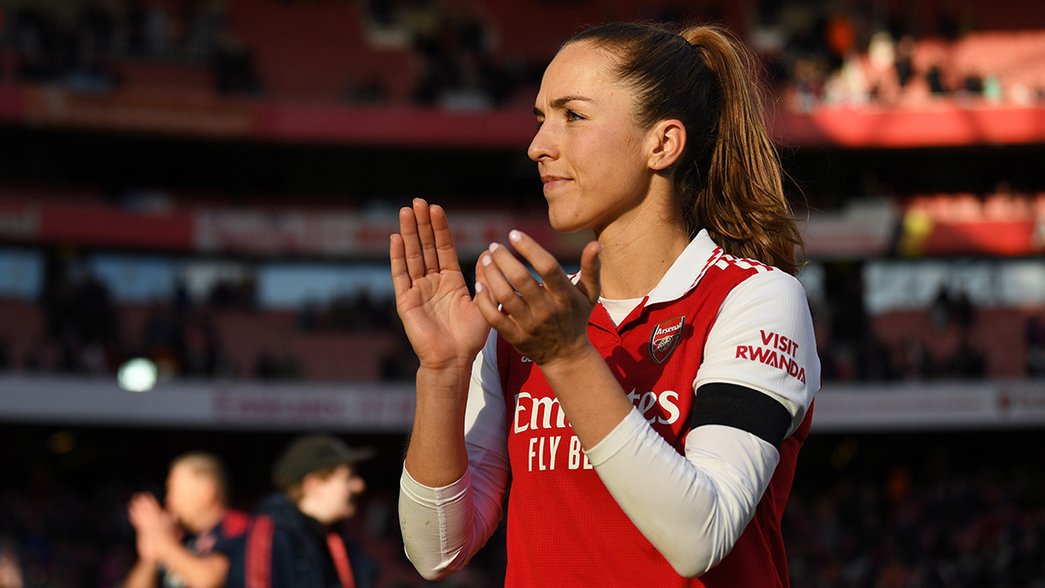On the final day of Women’s History Month, here is a letter from Lia Walti.
In her own words, Lia talks about the importance of visibility, being a role model and the key to chasing your dream.
Visibility is everything. In this world, it’s so hard to be what you can’t see.
When I think back to my childhood, I have a lot of special memories of football, but it’s also quite sad to think that I didn’t have someone to look up to in the sport; someone who inspired me or who I could aspire to be.
There were generations of women’s footballers who obviously took all the small steps for us to get to where we are today, but they had to start so far back and all too often their stories were never told. Even on the rare occasion that it did appear in a newspaper, it was always the smallest printed story in the sports section.
I think the first time I could say I genuinely looked up to a women’s footballer was when I started to be involved with the national team aged 16. The reason why? It’s simple, I finally had the chance to get to know the players. At the start, it was only the players in the Swiss national team, but after a few more caps, I had the chance to analyse some other teams and I started watching women’s football more because it became accessible to me.

It was like I’d entered a whole new world because suddenly there were all these talented players that I’d never heard about before. Players like Marta were the only real exception. She was such an important figure for so many footballers of my generation because she was one of the only names that people actually knew.
We spoke about this a lot in Switzerland when we really tried to bring women’s football forward. We always said that you need to bring women’s football to the people, you can’t just expect people to go there themselves. Everybody tries to give responsibility to someone else, but if you put it on TV, people are going to watch it, and when people get to know the players, they become invested.
That’s when you create a supporter who wants to come and watch the games and buy a shirt for their favourite player. TV stations and the media have always had such an important role to play in the growth of the game.
For me and so many other players, we had to be the change that we wanted to see. Because of the previous generations, we were in a privileged situation where a lot of battles had already been fought and a lot of things were already in place, but the real push and action to actually make things visible wasn’t there yet, and I think that’s something that’s finally come with our generation.
I feel really privileged to have experienced both sides, when we weren’t being shown on TV and only had 100 people coming to the game, compared to now where we’re playing in front of sold-out crowds and big stadiums on BT Sport and Sky. It’s really nice to have seen both sides, but I also think that there’s still so much work to be done and that future generations will also have to fight for their next steps.
I just really hope that we never forget the work and sacrifice made by previous generations because we’ve all had a role to play in this.
To be honest, with the speed at which a lot of this growth has happened, some of it still really catches me by surprise. As someone who grew up without a role model in the women’s game, I find it incredible that I’m now considered that person for a lot of young supporters.
It’s funny to me because in myself I’m still just a normal person - we all are! But now that we’re doing something which is accessible for a lot of people to watch, it’s very easy to forget how much responsibility you actually have for what you’re doing on and off the pitch. But I personally find it really nice because I think it can affect young kids in a really, really positive way.
To have that opportunity to both show on the pitch what you can do and what your strengths are, then also show off the pitch how you can reach that by sharing your story, that’s something I find really nice. I love to have those conversations with young kids so that they can ask all the questions they want about how to one day be where we are, or just how to follow their dreams.

Women’s History Month is so important for so many reasons to me. Not only because it’s a celebration of what women have achieved over history and in society, but also because more generally, it’s 2023 and every day we still have to speak about the different areas of women being disadvantaged compared to men.
Sport is an area where that can be easily highlighted. That’s why it’s so important for me to try and be a role model and to try and push the boundaries of football to make it better for future generations, and sadly I think every woman in their own category has had to do that one way or another.
We’ve seen what an incredible impact some of these changes have had on the world and that’s what keeps me so motivated to keep fighting and talking about moments like Women’s History Month.
So, to any young Gooners and girls out there, my message is simple; don’t be scared to dream. Take small steps, one at a time, and don’t look too forward. Don’t lose your smile and make sure that your happiness and enjoyment is right at the heart of your dreams.
If it’s what you really want, fight for it and work as hard as you possibly can, because you can do it.

Copyright 2023 The Arsenal Football Club plc. Permission to use quotations from this article is granted subject to appropriate credit being given to www.arsenal.com as the source.













